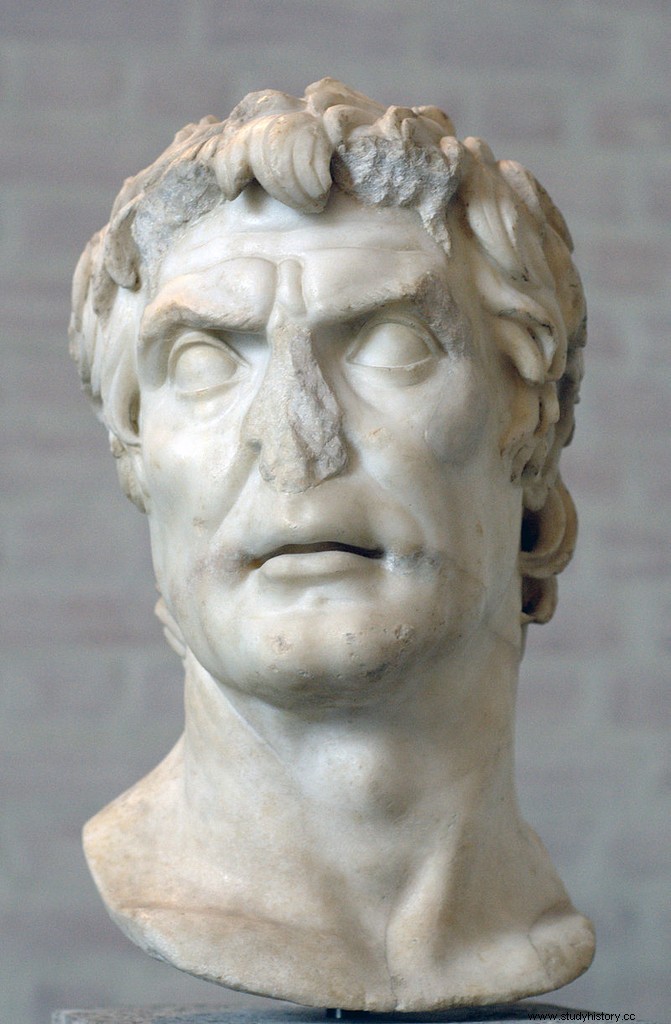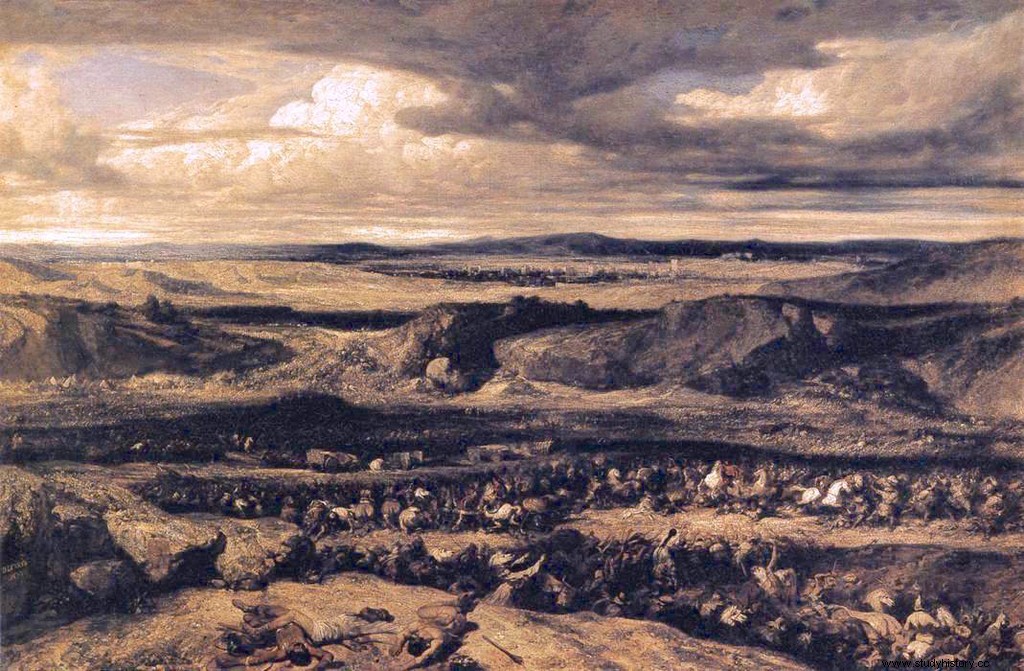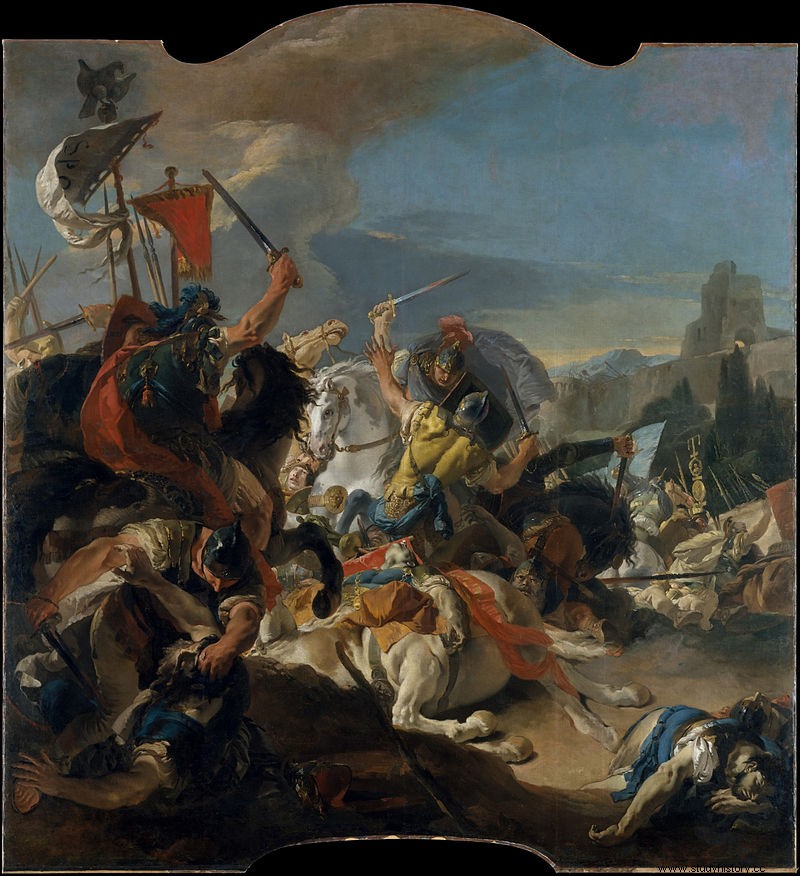
The evaluation of Lucius Corneus Sulla has been controversial since ancient times.
Some say they are republican destroyers, and some say they are republican incarnations.
Some say it's democracy, and some say it's a denial of democracy.
Where is the real image of Sulla?
This time I would like to take a look at such Sulla.
Born into the prestigious Cornelius clan
Unlike Marius, a commoner, Sulla was born into the prestigious aristocratic Cornelius clan.
The Cornelius clan has produced a large number of consuls, and the Roman hero Scipio is also from the Cornelius clan.
However, Sulla's family is not the mainstream of the Cornelius clan, and was even viewed as a fallen aristocrat. In fact, Sulla's family was rented without even owning a house, and Sulla himself lived like his mistress's pimp at one time. He may have been an attractive person, good or bad. Sulla will gain many allies and many enemies in later years.
Nonetheless, the prestigious Cornelius family, Sulla, will take the Roman career course by being elected Quaestor (Finance Officer) in 107 BC.
After that, Marius recognized his military talent and was appointed as an adjutant in the Jugurthine War.
Jugurtha was captured because Sulla approached King Box of Mauretania, Numidia's neighbor, and made a plan, but Marius took credit for everything.
It was clearly Sulla's credit, as Jugurtha believed in Box and was alert during the meeting with Box, and because of that plow, Jugurtha was captured by Rome.
Marius and Sulla get sick because of this matter.
From Marius's point of view, it was thanks to Sulla that he was able to end the Jugurthine War, and from Sulla's point of view, it was Marius who evaluated himself and gave him a chance to succeed. However, they were jealous of each other, and they probably had a bad deal with each other.
Marius, in particular, has a tremendous complex to the aristocrats and is also arguing with his predecessor commander, Metterus.
Common people (Populares) and optimates (Optimates)

Marius was originally from the commoners, and formed a faction called the commoners, including the people around him. Marius' military talent is overwhelming, and he has driven more than 100,000 Germanic people from the north to destruction with less than one-third of the troops ( Cimbri Teutons War ). strong> ).
Due to this overwhelming military service, the Consul won an unprecedented seven times, but a noble-centered faction called a noble faction centered on one of the Senators has also been formed, and the confrontation with the common people faction has been formed. It was deepening.
Unfortunately, it is hard to say that the sect is military superior, and the commander who writes is often defeated by the Germanic people, etc., compared to Marius, who has won consecutive battles. This may have deepened the conflict between the two factions.
In traditional Roman culture, consuls could not be reelected unless there was a great deal of time, and in that respect they would not have been on good terms with the traditional Senate.
The relationship between Marius and Sulla included conflicts between these factions, but Marius had a section that bought Sulla's military talent more than anyone else, and was appointed as an adjutant in the Cimbrian War. ..

It is a creature that makes friends with humans as long as they have common enemies, but begins to fight each other as soon as the enemies disappear.
The traces of the Germanic invasion were getting worse, and the relationship between Marius and Sulla was getting worse, which could be said to be the worsening of the relationship between the commoners and the Senate.
In that case, the trend of the Equites class, which is not affiliated with either, becomes important.
These classes, also known as the knight class, have made a fortune by undertaking tax collection and the like. In terms of the occupation, it is closer to a merchant than a samurai.
Both sides skillfully increased their allies and divided the whole of Rome into two.
Armed clash with Marius
The turning point for the two, no, for Rome, was the war in the Alliance City, which had maintained an alliance for over 200 years.
The Corruption of Rome Although it was a war that seemed to be extremely rare here, Sulla made a wonderful achievement in this war and gained the support of Roman citizens.
Marius, on the other hand, is over 60 years old and has not played a major role in this war. On the contrary, Saturninus, who can be said to be confident, began to like Marius's majesty as much as he wanted, so he was taken hostile by the Senate and even the final recommendation was given. Marius himself subdued Saturninus, and he was almost retired.
The Social War itself was resolved by the enactment of the "Lex Julius Caesis" issued by Lucius Julius, but at the same time, Pontus King Mitridates of Asia Minor, who is aiming for supremacy of the Mediterranean Sea, shows anti-Roman movements.
The Senate decided to dispatch Sulla, but Marius went on a coup d'etat to the Senate through a person named Sulpicia, aiming for that plow.
Just a greedy old man.
Roman historian Theodor Mommsen, who later became a Nobel Prize-winning writer, described Marius as follows:
"In Marius, the lack of political education was fatal."
Is that so?
Surukipius submits the Surukipius bill to the Senate. The content was Marius's reinstatement and Sulla's defeat.
The Senate has no choice but to approve this, making Sulla an enemy of Rome.
However, Sulla immediately returned his heels and began marching towards Rome.
In the nearly 700-year history of Rome, Sulla was the first commander to advance his army to Rome.
Marius was completely struck by a gap and fled the country, and Surukipius, who submitted the bill, became a person who never returned.
Sulla entrusted the consul Kinna with the aftermath and went to the fight against Mitridates, but what he lost was that Kinna turned over to Marius.
Kinna's ambitions were thwarted by his colleague Consul Octavius, but Marius, who was hiding in North Africa, heard this and joined Kinna, who in turn began marching towards Rome.
Marius Massacre and National Enemy
Gerontocracy is terrifying. No one stopped Marius from marching on Rome.
Marius slaughtered hostile senators. Or they also slaughtered the optimates who formed the sect. On the contrary, he slaughtered even the civilian people he did not side with.
It's just a slaughter king.
Many people, including the father of Crassus and the uncle of Caesar, who were later killed by Pompey's father, were purged by Marius.
Immediately after that, Marius died of illness.
Kinna, who succeeded her, had neither ability nor popularity.
All he did was marry his daughter to Julius Caesar and revive the Skillpinus Act to make Sulla the enemy of the nation.
Still, while Sulla is fighting against Mitridates, he has been in the Consul for the third consecutive year as a representative of the civilian faction.
War with King Pontus Mitridates
Sulla knew what he was doing in his home country, but he dared to ignore it and face the fight against Mitridates.
Sulla is a man who cannot be grasped.
Had Sulla been a person like Marius who simply wanted power, he would have been able to march to Rome and regain power.
Sulla didn't do that.
Sulla's priority was to conquer the republican Roman enemies.
Sulla overwhelmed King Pontus with overwhelming momentum.
It was said that the number of soldiers led by Sulla was about 30,000 and the supply was not enough, and the total force of Mitridates was about 300,000.
Furthermore, the Roman army led by Flux was stationed from the Roman Senate, which was in power by the common people.
Sulla was calm even in such a situation.
Based in Athens, Sulla fought with Mitridates when he was ready for the fight.
Despite being overwhelmingly disadvantaged in terms of troops, Sulla won overwhelmingly.
The damage on the Pontos side exceeded 100,000, while the damage on the Sulla side was only 12 people. I wonder if it's true, but it was true that Sulla defeated Mitridates with almost no wear.
Sulla is said to have done what Hannibal and Scipio did in Greece.
Kill the assaulting Greek tanks, besieged by cavalry and annihilated. After all Hannibal strengthened Rome.
It is also interesting that Scipio and Sulla, who defeated Hannibal, belong to the same Cornelius clan.
Mitridates sent troops again and faced a decisive battle with Rome in the battle of Caironaya, where Philip II once defeated Athens, but this time it ended in the victory of Sulla, who is based in Athens. The Greek side had not grown tactically since the time of Alexander the Great. He was not an enemy of the Roman army who had won numerous battles and absorbed tactics.
Sulla immediately signed a peace treaty with King Mitridates.
And then the fight against the regular army of Rome awaited.
This Roman regular army was surprisingly weak.
There was nothing I could do to subtract the strength of Sulla.
Flux, the commander, died after a friendly fire with his adjutant Finbros.
Finbroth was no longer the enemy of Sulla.
The Roman soldiers had no intention of turning Sulla into an enemy, and everyone said that they had forsaken Finbroth and arrived at Sulla.
Finbroth died on his own.
It took several years for Sulla to land in Italy. Sulla knew that he would hurry and fail.
Sulla prepared carefully and waited for the time of landing in Italy.
Meanwhile, Roman Consul Kinna died.
The time has come.
March on Rome
Allies came one after another under Sulla who landed in Italy.
First Metterus Pius joined, then Pompey joined, Crassus joined, and other influential generals joined Sulla. It's a Roman All-Star.
Still, the battle was fierce.
The common people were inevitable. This is because if Sulla returns, there will be no life for them.
It was Sulla who won the battle to divide Rome into two.
Julius Caesar, 18 years old, fled the country.
Sulla eradicated the senators of the common people. The Samniums, who were on the side of the common people, were gathered and executed at the stadium.
The death devil echoed throughout Rome.
Sulla said to the Roman citizens who turned pale when he heard the voice, without changing his complexion.
"You don't have to listen to the voices of those who are being orthodoxly punished."
Marius's tomb was uncovered and all monuments honoring him were destroyed. Marius's relatives were slaughtered without exception.
Sulla did not loosen his pursuit. He made Marius a list of allies, published it, and made him pay a bounty.
They were not even granted the right to a trial.
They were deprived of their children and their descendants from the right to a key position in Rome.
It is said that there are as many as 5,000 people on the list.
The property confiscated from these people was auctioned off and wanted to be bought cheaply by the Sulla folks.
The person who bought the most of this is Crassus, who will become one of the pillars of the triumvirate later.
Sulla's pursuit was relentless, but the Romans wanted one person to be removed from the list.
Sulla kept refusing, but eventually broke.
Sulla knew. The extraordinary talent and popularity of that person.
If you turn that person into an enemy, you will be destroyed this time.
The man's name is Julius Caesar.
He later became the Roman emperor, the name of the German and Russian emperors, and the English emperor.
Sulla said before the petitioner.
"Don't you guys know? That guy has 100 Marius?"
Resign with a lifelong dictator
Sulla became a dictator and promoted reforms beyond the Gracchi brothers.
He increased the capacity of the Senate from 300 to 600 and doubled the number of important positions such as Consul and Praetor.
He also decided to send experienced Consul and Puerator as governors of the provinces.
A law called the Valerius Law was submitted to the Senate. The content was to make Sulla a lifelong dictator.
No one could go against Sulla anymore. Normally, Dictator had a term of six months, but the first lifelong dictator in Roman history was born.
Sulla made various reforms in welfare, public works policy and unemployment, justice and administration, and he resigned as a lifelong dictator after seeing the reforms.
After his retirement from politics, Sulla is said to have played and lived every day.
The days didn't last long, and Sulla died at the age of 60.
The funeral was held with a state funeral, and it was said to have been the most spectacular funeral in the past.
It is said that the following words were engraved on Sulla's tombstone.
"No one has done better than Sulla for his allies, and no one has done worse than Sulla for his enemies."
There would be no better word for Sulla than this.
Personal evaluation of Sulla
He will be one of the top five in Rome, both as a politician and as a guerre.
It's a part that isn't often dealt with in world history textbooks, but I even think it's a mistake to mention the Gracchi brothers and not Sulla.
However, it is not the only part that can be evaluated without letting go.
The crackdown on the common people will inevitably drop the evaluation.
It must have been the strength and identity of the Romans that they had the temperament to make hostile humans on their side.
It has disappeared since the Punic Wars.
That caused confusion in Rome.
Sulla is also one of the people who caused the confusion.
Even so, the part that has achieved results by reforming the administration and military system in a limited state is a part that can be evaluated more.
Although Sulla was extremely strong in combat, it is interesting that his reforms include civilian control that separates military and political affairs.
He was the best, but not a hero.
This is my personal evaluation of Sulla.
A hero would be someone who can be given light.
Sulla was excellent, but he wasn't there.
I think that's the difference with Julius Caesar.
